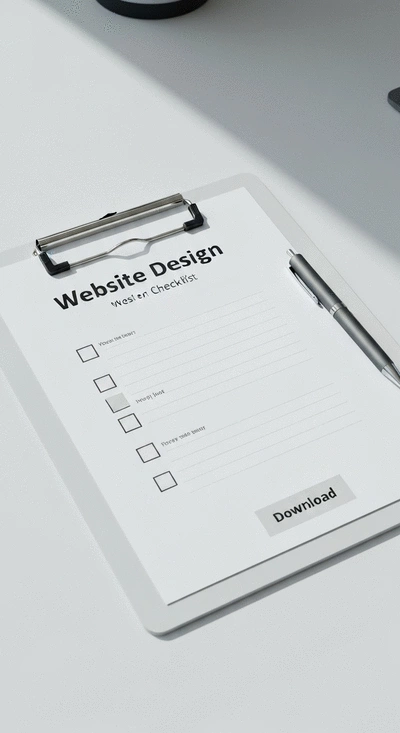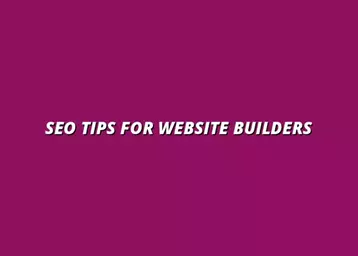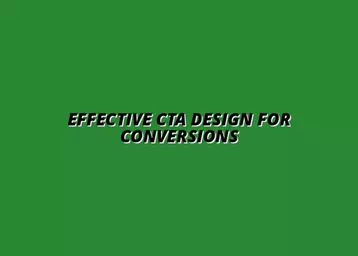Define Your Website's Purpose
Clearly articulate what you want users to do. This guides your design decisions.
Join Elena Rivers' community for beginner-friendly tutorials, design tips, and free resources to build your stunning website.
Posted on: 2025-11-19
By: Elena Rivers
Did you know that almost 75% of users judge a company's credibility based on its website design? Creating a stunning website is more than just aesthetics—it's about strategy and user experience. Let's explore the essential design foundations that will empower you to build a site that not only looks great but also meets your visitors' needs.
Here's a brief overview of the key design principles that can enhance your website creation journey. For more in-depth guidance, check out our essential website design tips for beginners.
Clearly articulate what you want users to do. This guides your design decisions.
Ensure intuitive navigation and a user-centric layout to keep visitors engaged.
Design with mobile users in mind to ensure accessibility across devices.
Reflect your brand identity and engage users with a well-thought-out palette.
Ensure your messages are clear and include strong calls to action.
Improve load times and accessibility to retain visitors more effectively.
As someone who's passionate about empowering beginners to create beautiful websites, I know that laying a solid design foundation is crucial. Whether you're crafting a portfolio, starting a blog, or launching a small business site, your design choices will directly impact user engagement and overall success. In this section, we’ll explore how to define your goals, emphasize user experience, and set the stage for your website's design.
Let’s dive into the first steps of your web design journey. Understanding your objectives and the type of audience you want to attract is essential. This knowledge will guide your design decisions and help you create a site that resonates with visitors right from the start.
Before you even start selecting colors and layouts, it’s important to define your website's purpose. Are you sharing your photography, promoting your business, or possibly documenting your travels? Knowing this will shape every aspect of your design, from layout to functionality.
Once you’ve defined the purpose, set measurable objectives. This could include increasing traffic, generating leads, or enhancing user engagement. By outlining what success looks like for you, you’ll be better equipped to measure your progress and make necessary adjustments along the way.
To effectively communicate your vision, start by clearly articulating the main goal of your website. Ask yourself: What do I want users to do when they visit? This will inform design elements and key functionalities you should include.
For instance, if your goal is to sell products, you’ll need to focus on an intuitive e-commerce layout. On the other hand, if you’re creating a blog, prioritize readability and easy navigation.
After defining your site's purpose, it’s time to set specific, measurable objectives. This can include:
Having these goals in mind will not only guide your design process but will also help you stay motivated as you see your website grow and evolve!
Now that you’ve set goals, let’s talk about the importance of user experience (UX). A great design isn't just about how it looks; it’s about how easy it is for users to navigate and interact with your site. Prioritizing UX will ensure that visitors enjoy their experience, making them more likely to return. To further enhance your understanding, consider exploring our guide on essential UX design for beginners.
From intuitive navigation to engaging layouts, thoughtful design can significantly enhance how users perceive and interact with your content.
One of the key elements of a positive user experience is intuitive navigation. Users should easily find what they’re looking for without feeling frustrated. This includes:
Always think about how your audience will interact with your site. A well-structured navigation system keeps users engaged and encourages them to explore more!
A user-centric layout is all about placing your audience’s needs front and center. This means designing a layout that guides visitors naturally through your content. Start by considering how users will consume your information and what actions you want them to take.
Incorporating visual elements, such as images and videos, can enhance engagement. Just make sure to keep the layout clean and not overcrowded—less is often more!
When designing your website, pay close attention to the user interface (UI) elements. These are the buttons, forms, and other interactive components that allow users to engage with your site. Make sure they are:
By enhancing your UI elements, you pave the way for better interaction and a more fulfilling experience for your users!
With your goals and user experience in mind, it's time to delve into some fundamental design principles that every beginner should know. These principles will help you create a website that not only looks great but also functions effectively for your audience.
Let's explore these principles and how they can transform your website into a stunning online presence.
What aspect of website design do you find most challenging? We'd love to hear your thoughts! Share your response below:
Defining your website's purpose clearly helps guide all design decisions, from layout and content to functionality, ensuring the site effectively meets its intended goals.
A mobile-first approach means designing your website for mobile devices first, then scaling up for larger screens. This ensures optimal accessibility and user experience across all devices.
You can improve UX by creating intuitive navigation, designing user-centric layouts, optimizing content for clarity, and enhancing UI elements to be visually appealing and easy to interact with.
Measurable objectives can include achieving a specific number of monthly visitors, generating a target number of leads or inquiries, or encouraging visitor engagement through comments or shares.
As we wrap up our journey through the essential elements of website design, it’s important to reflect on the key principles that can elevate your online presence. Building a stunning website is not just about aesthetics; it’s about creating a space that resonates with your audience and meets their needs. Let’s recap some of the critical design tips for beginners that I’ve shared throughout this guide!
Here’s a quick overview of the major takeaways that can help you create an effective website:
These design principles not only make your website visually appealing but also functional, ultimately leading to a satisfying experience for your visitors. Remember, continuous learning and adaptation are key as design trends evolve! For practical advice on optimizing your site's structure, read our article on optimizing your site structure today.
In the world of web design, staying informed about new tools and techniques is crucial. As I often remind my students, every project is a learning opportunity. Engaging with online resources, participating in webinars, and connecting with fellow creators can provide fresh insights that enhance your skills. Don’t hesitate to experiment with different design elements or approaches—you might just discover what makes your website truly shine!
Now that you have a solid foundation in web design, it’s time to take action! I encourage you to apply these tips and start building your own website. But before you dive in, I have some valuable resources to share!
To help you stay organized and focused, I’ve created a 10-Point Website Design Checklist. This handy guide covers all the essential steps you need to take when designing your site. You can grab your copy here and ensure you don’t miss any critical elements during your design process!
Additionally, I invite you to become part of our vibrant community at Website Design Free. Here, you can connect with fellow beginners, share your progress, and access exclusive content that will support you on your design journey. Remember, you’re not alone in this—you have a whole community cheering you on!
Let’s build something amazing together! If you have any questions or need guidance along the way, feel free to reach out. I can’t wait to see the stunning websites you’ll create!
Here is a quick recap of the important points discussed in the article:



 As the digital landscape continues to evolve, understanding the nuances of SEO becomes vital for any
As the digital landscape continues to evolve, understanding the nuances of SEO becomes vital for any
 Effective design is not just about aesthetics; it plays a crucial role in guiding user behavior and
Effective design is not just about aesthetics; it plays a crucial role in guiding user behavior and
 Choosing the right website builder can be pivotal for your online success. Whether you're a novice o
Choosing the right website builder can be pivotal for your online success. Whether you're a novice o